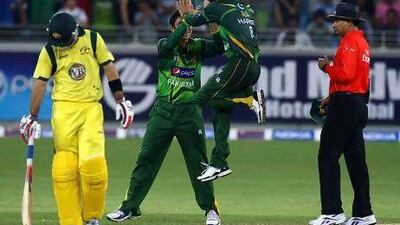DUBAI // No Shahid Afridi, no problem for Pakistan. Two days after falling to a 50-over series defeat in Sharjah, Pakistan slipped seamlessly into Twenty20 mode as they thrashed Australia at the Dubai International Cricket Stadium last night.
The fact they did it with a negligible contribution from their usual suspects augurs well for Mohammed Hafeez, the captain who had been forced to defend his side against accusations of being a one-bowler team before the game.
Accepted wisdom had it that Pakistan's attack is totally reliant on Saeed Ajmal at present.
George Bailey, Australia's T20 captain, hit on a theory the day before this game that Ajmal would be less of a threat than he had been in the one-day games, mainly because he would get six overs less bowl.
But what about everyone else? Ajmal did manage two wickets, and at a parsimonious rate, too, but Sohail Tanvir got three and Hafeez two with his underestimated off-breaks.
Even by Twenty20 standards, this was a game in fast forward, but there was enough time for Pakistan to unearth a new gem.
Raza Hasan would have been forgiven for having sweaty palms when he came on to bowl his first spell in international cricket - not least because of the 33°C heat and the high humidity.
However, despite his tender years, Dubai has already proved a happy hunting ground. He marked himself out as one to watch two years ago when, as an 18 year old, he took nine wickets in three matches for Pakistan A team against the England Lions at this ground. Drawing on that experience will have allayed some nerves.
Plus he had already got one major thrill out of the way earlier in the night, when he had his newly minted Pakistan cap placed neatly on his head by Afridi, the all-rounder who was absent with a hand injury.
Australia's total of 89 was their second lowest ever in the format, and their worst in the seven years since they were all out for 79 in England. Probably the most telling statistic in the game was the fact they managed just three fours - and not one after the fourth over - and no sixes in their innings.
Tony Hemming, the Australian curator at Dubai Sports City, had estimated that totals of 170 could be gettable in this T20 series before it started.
As such, Australia's inexplicably poor effort with the bat was always likely to be way below par, and the Pakistanis eased towards their victory target.
Kamran Akmal, their wicketkeeper batsman, managed to trump the oppositions tally of sixes in the space of one swing of the bat.
He managed three boundaries to boot, in his unbeaten innings of 31 which was the top individual score of the match. As if to apply an exclamation mark to Pakistan dominance, Shoaib Malik settled the victory with 31 balls and seven wickets to spare with a showy straight drive off Shane Watson.
Hafeez praised a "great team effort" by his side and singled out Hasan for credit while Bailey told on pitch reporters: "We were completely outplayed. The pitch was a little bit slow, but the top order need to bat for longer and score more runs, that is the name of the game in T20.
"We are working towards the World T20, and this is the first step towards that."


